#Chén Qíng Lìng
Text
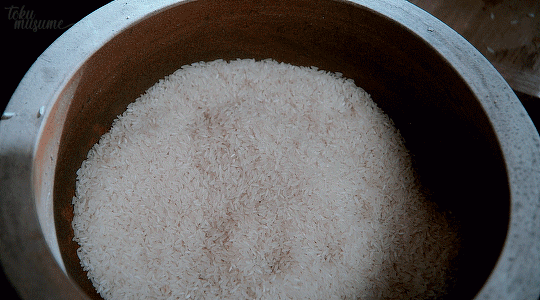
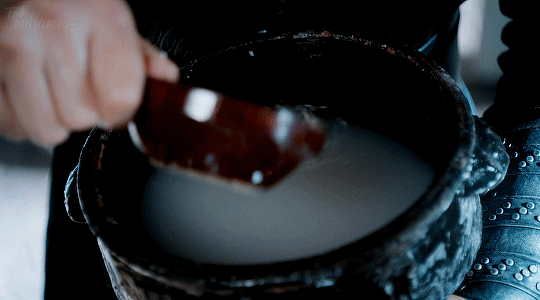
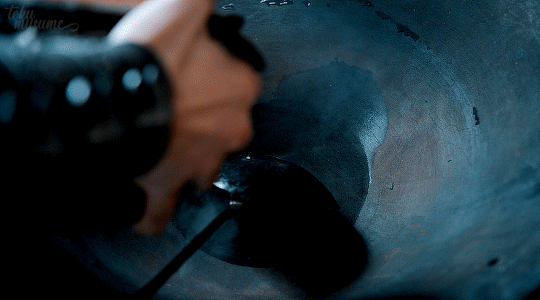


#The Untamed#Chén Qíng Lìng#CQL#Xiao Zhan#Wei Wuxian#cooking#congee#food#cdrama#gif#tokumusume:gif#masterchef yi city#ngl i would eat that
196 notes
·
View notes
Text
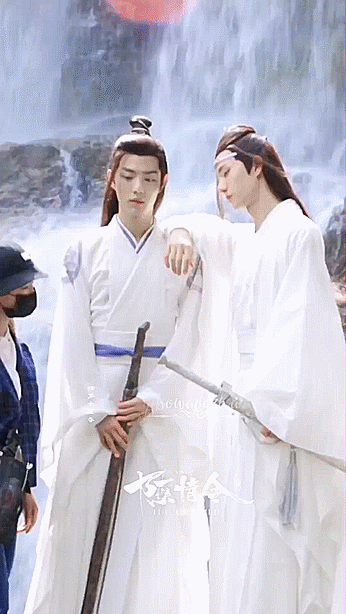
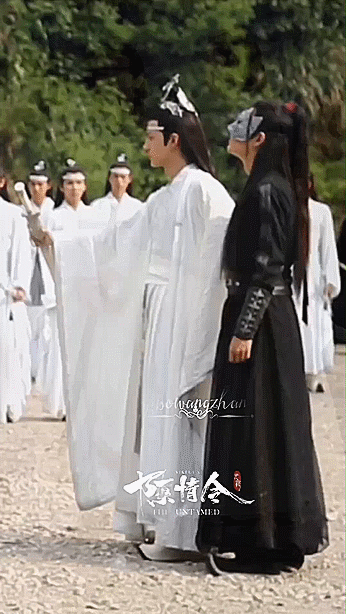
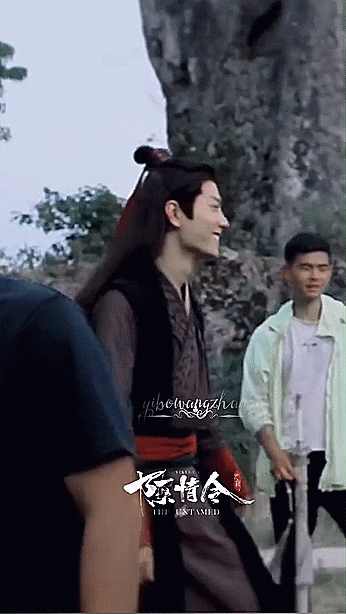

Cdrama: The Untamed (2019)
Oh na na na
Watch this video on Youtube: https://www.youtube.com/shorts/Ap8w26rPTBE
#The Untamed#陈情令#Grandmaster of Demonic Cultivation#The Founder of Diabolism#Mo Dao Zu Shi#MDZS#CQL#Chén Qíng Lìng#Chen Qing Ling#Chan Ching Ling#魔道祖师#陳情令#魔道祖師#2019#Tencent Video#WeTV#youtube#chinese drama#cdrama#short video#shorts#Xiao Zhan#Wei Wu Xian#Wei Ying#Wang Yi Bo#Lan Wang Ji#Lan Zhan
31 notes
·
View notes
Text

a little something for a friend’s bday
14 notes
·
View notes
Text
Stacking the Shelves #234
Stacking the Shelves #234
Stacking the Shelves – a weekly meme hosted by Reading Reality
what’s the buzz: weekly round-up and book haul
It’s been a crazy busy week! It was my birthday on Thursday and I finished up for a week and a half holiday on Wednesday but the time has zoomed by and before I know it, it’s Sunday and I still haven’t gotten this post up!!
Apart from rushing about like a headless chicken, I’ve been…

View On WordPress
#A Touch of Magic Designs#bibliophile#book geek#book haul#book merch#book merchandise#BOOK NERD#book nerdigans#book photography#book swag#BookBestiesUK#BookChicBoutique#BOOKISH#bookish merch#bookish merchandise#bookish swag#booklr#books#cdrama#chén qíng lìng#chinese drama#cql#etsy#grandmaster of demonic cultivation#hanguang jun#heaven official&039;s blessing#Hua Cheng#lan wangji#lan zhan#Lemoncielart
0 notes
Text
Whoever made Xiao Zhan and Wang Yibo (Wei Wuxian and Lan Wangji’s actors) sing the main ost of The Untamed, which is 無羁 (wú jī)— had made the best decision in the entire decision making world.
Whoever decided to name it 無羁 (wú jī) and make it the WangXian version (from the books/donghua) of the live adaptation, and also the one that Lan Wangji canonically composed as a theme song for him and Wei Wuxian — had made the second best decision in the entire decision making world.
Whoever decided to make the official English title of 陳情令 (chén qíng lìng) as “The Untamed” which also means “unrestrained” or “無羁 (wú jī)”— had made the third best decision in the entire decision making world.
Like it was so genius? Knowing that whenever you listen to 無羁 (wú jī), it’s Wei Wuxian and Lan Wangji themselves singing the song? Their theme song? And that even though they censored it, they still managed to make the song name a combination of their names (Wuxian + Wangji)? And that the literal English translation of 無羁 (wú jī) is “unrestrained” which can also mean “Untamed”?
youtube
#aside from wangxian#i’ll also be adding wuji in my tags from now on#the untamed#cql#lan wangji#lan zhan#wei wuxian#wei ying#wangxian#wuji#Youtube#xiao zhan#wang yibo#i’m sorry my thinking might be wild#but when i realized that wuji is also a combination of their names#the first thing i thought of was how wwx was written before lwj so it’s giving my bottom lwj rights 😂😂😂#which is acceptable (but i think in cql only? since book/donghua fans rage about the thought of bottom lwj)#but if u look at cql lwj i think theres no problem 😂#my useless essays
340 notes
·
View notes
Photo
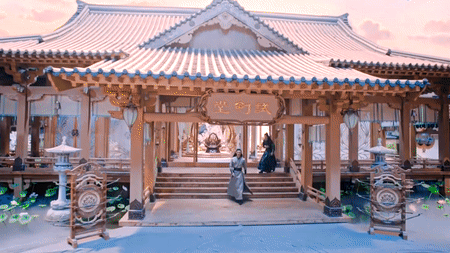
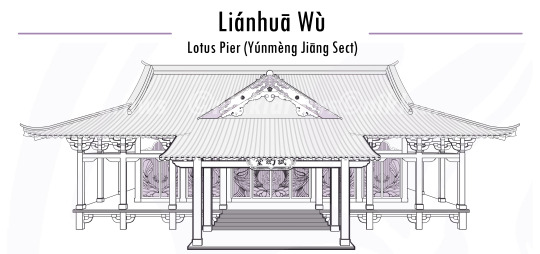
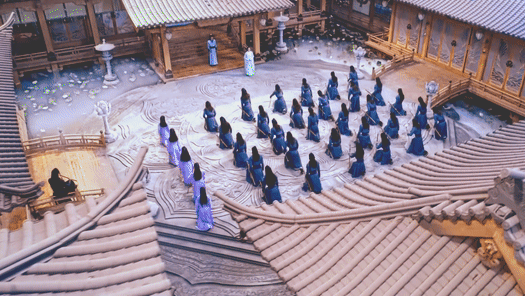



我做梦都想回去...
Even in my dreams, I want to go back…
The Untamed locations: Lotus Pier 莲花坞/Liánhuā Wù
It’s finally here! The third installment in my ongoing Chén Qíng Lìng drafting saga, Lotus Pier! As the residence of the Yúnmèng Jiāng Sect, Lotus Pier (莲花坞/Liánhuā Wù) is arguably one of the most important locations in the narrative of Mó Dào Zǔ Shī. Built among sprawling lotus ponds in the lazy shallows of a vast, meandering river, Lotus Pier shapes the halcyon days of the Jiāng siblings’ youth. It is a warm and lively place, its people welcoming and carefree.
The complete diagram:

(Full set details/meta below.)
Part 1: The Jingshi
Part 2: The Hanshi
Prints now available at ✨ INPRNT! ✨
You can also support me on Ko-fi ☕
Honestly, the few gifs I have used do not come close to showing you the huge scale, or the level of detail and care that has evidently been put into this set by the CQL production team.
Before I attempt to describe the place that shaped much of our main characters’ lives, let me first share with you the set layout with reference to some aspects of traditional Chinese architecture (and please bear in mind, I’m not an authority on the subject. Links to sources/appropriate references are provided).
Understanding the set layout:
The main compound of Lotus Pier is set out loosely following the typical, traditional layout for residences containing a courtyard.* Rooms are placed at the four cardinal points, creating a central axis and a secondary horizontal axis. With the courtyard facing south, the most important buildings are placed to the rear (north), such as the parents and grandparents’ bedrooms and the ancestral hall, while the siderooms (typically for the sons’ families) are placed to the east and west according to auspicious philosophies (like fēng shuǐ) and social hierarchy:
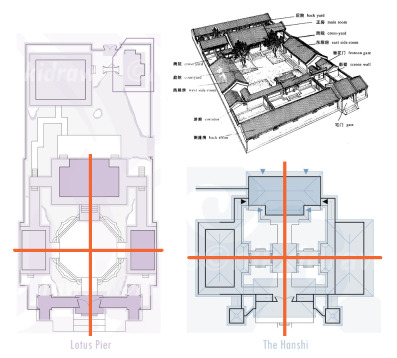
* At least, in the northern regions of China. Although Héngdiàn World Studios, where most historical and xiānxiá dramas are filmed, is located in Zhèjiāng, it seems a lot of the sets at Hengdian are based on northern designs.
In true “courtyard houses” (sìhéyuàn or sānhéyuàn, depending on whether the courtyard is fully enclosed), this quadrangle layout would then repeat along the central (N-S) axis if the residence contains one or more ‘inner courtyards’ (Fig.3 below):

However, I would not call Lotus Pier a true “courtyard house” as it is freer and more spacious in form than, say, the Hanshi’s courtyard design** and both sets are part of a larger compound anyway, rather than a standalone residence for a single family - so the comparison may be redundant. For instance, Lotus Pier’s stilt foundation and large, sloping roofs also bear an interesting resemblence to the wooden storied houses of Yúnnán, which is a completely different type of vernacular architecture.
** That being said, there is a wealth of research on the different variations in this type of vernacular architecture [x] [x], which does include differences in siheyuan design based on climate (wherein the buildings are quite generously spaced apart, and the courtyard much larger, to deal with the warmer climate in southern regions of China).
Nevertheless, we can see the cultural and cosmic philosophies which influence these courtyard homes used at times in the design of Lotus Pier.
For instance, we see in episodes 14 and 18 that first Jiāng Chéng, and then Wèi Wúxiàn lived in the eastern room - both seperately and together - in their childhoods. (We can assume that Yànlí would have lived in a room nearer her parents, located in the back of the residence so as to lessen her appearance in public as an unwed daughter.)

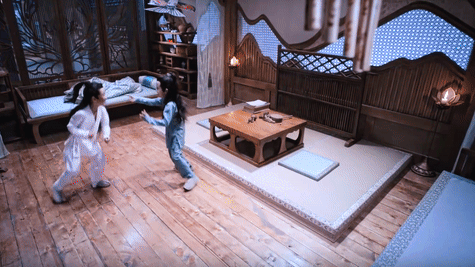
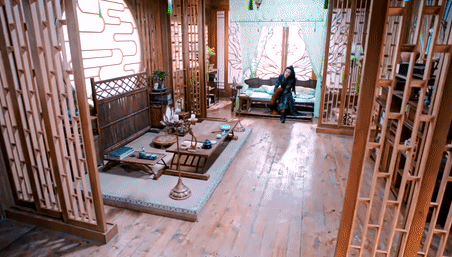
(Although the two rooms have been dressed differently, the raised platform, reused props, and WWX’s running shot from the inside to the outside in episode 14 show that it is the same building. Additionally, you can head here for some ramblings on the interior of WWX’s room and some analysis on camera angles.)
You may also be able to see from these gifs that these siderooms are divided into three sections, which relates to the construction of traditional buildings in three or five ‘bay’ structures:
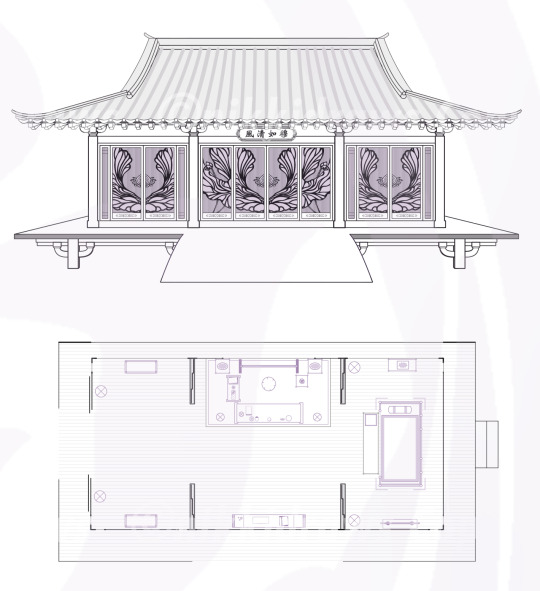
A ‘bay’ is the space between columns of a building. An even number of bays, or jiān/間, was thought to be unlucky, therefore the three bay structure was the basic layout of a commoner’s home, with additional bays added based on the need for space or the wealth of a family.
Interestingly, the room on the west side of the courtyard is shown to be Jiāng Fēngmián’s study, rather than another bedroom as I originally assumed - one that may have been for an older Jiang Cheng, although as the son and heir of the Jiang famly, his room would traditionally remain on the eastern side of the house (where WWX’s is). Then again, the main courtyard is an odd place for a bedroom in the first place, so perhaps we might be looking at a conflation of public and private spaces due to constraints on the set designers.
As a sidenote, JFM’s study appears to back onto a private lake, seen through the rear viewing window. I think this must be CGI, however, as I can find no angle of the set that shows this exists as part of the structure.

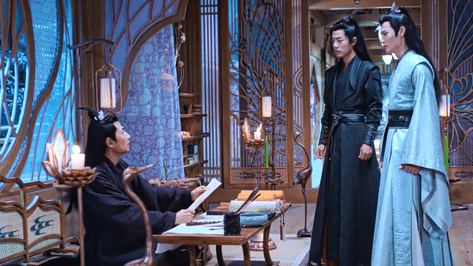
With all this said, let’s not forget that this is a xiānxiá drama: historical accuracy is not the goal. Instead, the producers took their time finding a ‘cultural location’ for each Sect, through which they could develop a more artistic aesthetic by drawing on the atmosphere and charm of their desired location. This brings us to the set’s design, and what it may represent about the people of MDZS’s Yunmeng.
The set’s design:
For the Yunmeng Jiang, producer Yáng Xià states in the link above that the showrunners drew inspiration from Húběi province, particularly the Jiānghàn plain that now lies in the heart of Wǔhàn. It is here the Hàn river joins the vast flow of the Yangtze as it meanders its way through the eastern provinces of Central China.
Just as Wuhan has been a major port city since the earliest dynasties of Imperial China, it’s fair to assume that the river that flows through MDZS’s Yunmeng has likewise influenced those living on its banks:
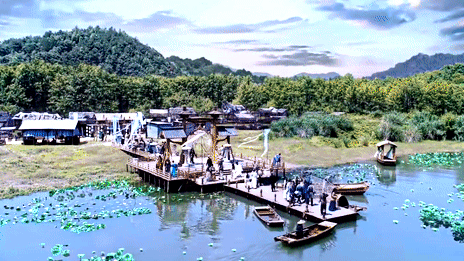
One of our first, and repeated, impressions of Lotus Pier and Yunmeng is how lively and welcoming this busy harbor and its people are. A major transport hub in its own right, with links to Lánlíng, Yumeng people are at home on the water.

The Jiang are unrestrained and easy-going, open-minded and generous. To reflect this, Lotus Pier was likewise built to be “broad and open”, the easy curves of the roofs and the wide, open walkways creating a sense of transparency and openness; the fluttering gauze curtains soften and compliment what otherwise might be an imposingly broad structure of warm-coloured wood:
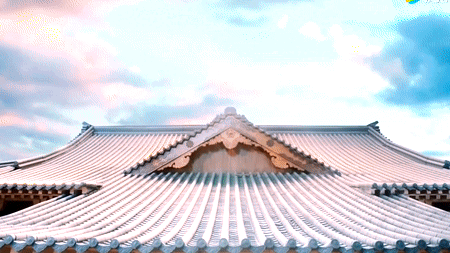
The marketplace that sprawls from the main landing likewise tells us that Lotus Pier and the wider Yunmeng area is a place of trade and craftsmanship.
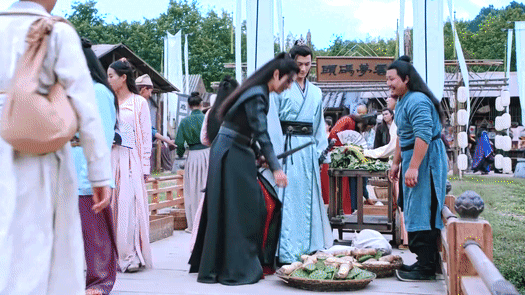
We see lotus seeds and pods harvested frequently, and as strong swimmers and talented fishermen, we might assume that the Yunmeng people are also skilled at weaving fishing nets and other such tools from the abundance of natural materials the fertile floodplains afford them.
As an aside, I do wonder why JFM decided to decorate his seat of power with rolls of reed matting/blinds.

I like to think they’re wares from the market, to display his peoples’ craftsmanship. You have to admit, the effect is impressive, immitating an unfurling lotus:
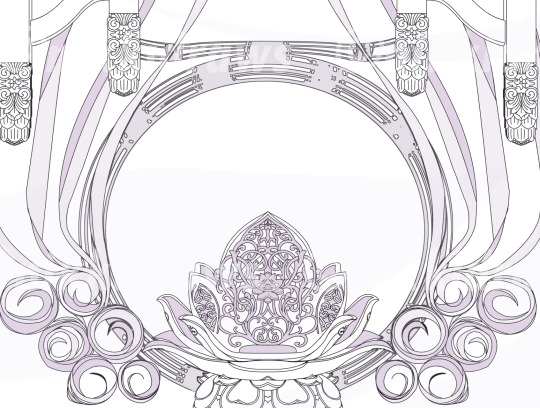
The one area that intrigues me the most in this main courtyard, however, is the kitchen. The private dock in the kitchen really exemplifies how the river has had such a huge influence on the design of Lotus Pier, by virtue of the waterborne livelihood it has curated among the Yunmeng people:
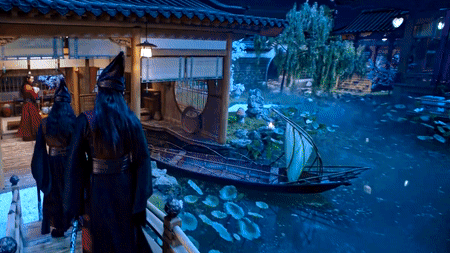

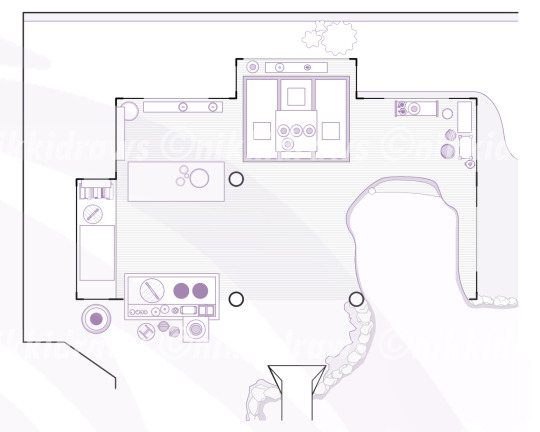
I like to imagine that fresh produce from the market would arrive by boat early in the morning, and Yanli would be there to help unload the goods while she prepares breakfast for her family...
What struck me most, though, during the course of this whole study was the dreamy, almost fantastical quality to the set. As I said above, the xianxia genre allows much more creative license with the aesthetic of the Sects and their domains, as the genre does not need to replicate a time or place with rigid historical accuracy. As such, much care and ingenuinty has been taken by the show’s designers to merge the Pier with the river, giving the impression that, like the lotus flowers that give it its name, the Pier also floats on the water itself.

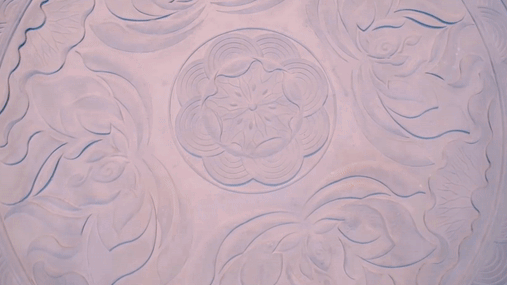
To that end, let’s lastly think about the lotus imagery we see around the set, and how it applies to the role of Lotus Pier as a place in the narrative.
The symbolism of the lotus
Revered for its beauty and much loved for its versitility in Asian cuisine and traditional Chinese medicine, the lotus holds significance in Chinese culture for many reasons. As one of the 'Flowers of the Four Seaons' (四季名花, Sìjì Mínghuā), the lotus flower represents summer, blooming through the season in the shallows of slow-moving rivers and river deltas.

「出淤泥而不染 / chū yūní ér bù rǎn」, an idiom meaning “growing out of mud, but remaining untainted”, is often attributed to a poem by controversial Confucian and Neo-Confucian scholar Zhōu Dūnyí called 'On the Love of the Lotus' ( 爱莲说, Ài Lián Shuō). Zhou calls the lotus flower a "gentleman among flowers" (not to be confused with the Four Gentlemen) as, rising dignified from the mud, it exemplifies the cosmic and spiritual harmony all humans should aspire to achieve. As such, it represents a moral ideal of dignity and integrity for a Confucian gentleman. As Zhou writes, “I love only the lotus, for rising from the mud yet remaining unstained; bathed by pure currents and yet not seductive.”
We cannot wholly attribute this idiom to Zhou, however, as this metaphor of the lotus flower, symbollic of purity of mind and body as it rises out of the muddy waters of worldly affairs, actually has its roots in the religious teachings of Buddhism and the Lotus Sutra. In it, the sacred lotus symbolises spiritual enlightenment and self-actualisation, where one is able to detach themselves from worldly affairs and overcome personal sufferings.
N.B. 18/04/2023 Edits have been made to reflect more accurate context regarding the prevailance of Buddhist thought in China since its introduction in the Han dynasty, and how Zhou’s ‘On the Love of the Lotus’ drew upon its teachings. See here for the original text and a review of its inaccuracies, as well as further resources.
How can we relate this back to the setting, Lotus Pier, and the Yunmeng Jiang? I think the most obvious parallel has to be the burning of Lotus Pier.
The event is the catalyst for a number of tragedies that occur throughout the narrative, and the Jiang siblings' attempts to reconcile the many layers of guilt, blame and grief they each feel with the enormity of losing their entire Sect, their home, their bonds with each other - the lotus emblem of their Sect is perhaps a reminder that there is no happiness without hardship.
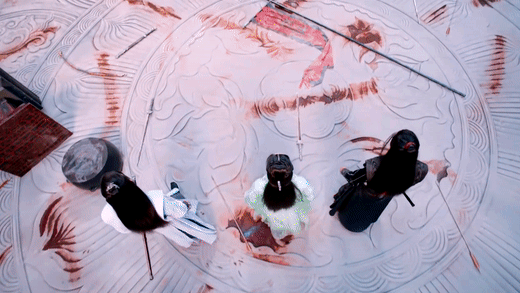
Of course, more important than its cosmic symbolism, for these siblings lotus ponds represent home, and are a way the three siblings can remain connected as they travel seperate paths in life, forming new families after the tragedy of their own:

In the scene pictured above - where WWX, after many months in self-imposed exile, succeeds in cultivating his lotus pond in the Burial Mounds - the pond represents his longing for Lotus Pier while also bringing him some comfort and connection to what he has lost. Just as Jīn Zixuān seeks to bring comfort to Yanli by planting a lotus pond for her, too:
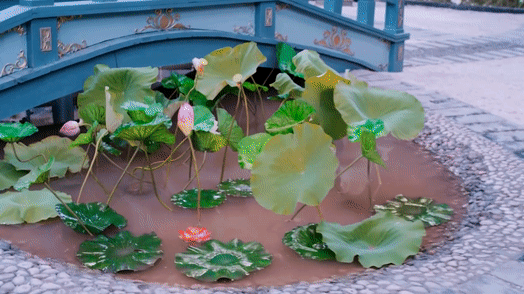

(Bonus gif of a different type of "gentlemen rising from the mud”):

But as an aside, it's also interesting to note that WWX tells A-Yuan in that above scene, that the lotus seeds are not to be eaten because they are grown in the soil of the Burial Mounds. Instead, they are 'the perfect thing to protect from evil spirits'. This may be a simple child’s tale for WWX to discourage A-Yuan from eating the tainted seeds, or it may refer to the spiritual purity the lotus symbolises. But as an interesting coincidence, lotus plants actually have the potential to filter nitrogen, phosphorous, and heavy metals from watersources, so it’s possible they taste bad because they are literally cleansing the soil of the Burial Mounds.
It seems appropriate, then, that WWX is tied closely to this lotus motif, perhaps even moreso than Jiang Yanli and Jiang Cheng. This is especially poignant when we consider that the lotus is also symbollic of resurrection and rebirth: the blooms, closing and opening with the sun in a daily cycle, can be compared to the cycle of reincarnation.
A great deal of the narrative focuses upon WWX’s decision to forge his own path through life, a ‘single-log bridge’ that sweeps him away from convention and propriety that governs the rest of the cultivation world as he struggles to maintain his own integrity and compassion. He suffers for this choice, especially once he gives up his golden core and is thought to be actively choosing an ‘evil’ path. Yanli even dreams of him floating away from Lotus Pier, carried on the rapid current of the river:
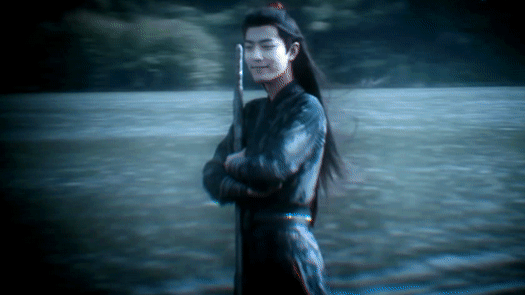
After his resurrection, however, it seems WWX has been able to finally rise above the Sects’ biases and political machinations. Once the Yin Iron has finally been sealed away, and the mystery of the Fierce Corpse solved, he no longer has any obligation to stay in those muddy waters of the cultivation world. He is free to wander, as his parents did - the single log bride widening to encompass the whole world.

Although still tied to the world by his love for his family and friends, we could say that WWX is close to that enlightenment the lotus represents. He has risen from the mud and, despite all his suffering, has remained untainted.
Bonus details!
If you’ve made it this far, congratulations! This got... so long... But of course, I had to do Lotus Pier justice as such a beautiful and thematic set. As a final point, here are some small details you may have missed or that I couldn’t fit in the main analysis!
Here is a cute interior shot of WWX’s room, and a view of the rear courtyard that shows the moon gate entrance, which presumably provides access for boats to dock in the kitchen:
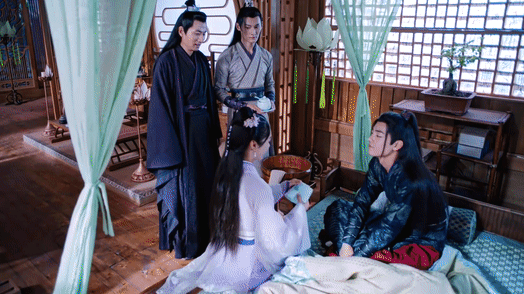
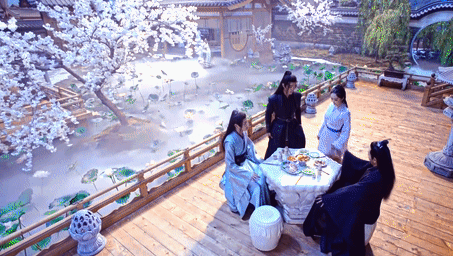
Also join me in appreciating how detailed the design on the door panels is! So much so that I couldn’t do the finer details justice in my sketch:
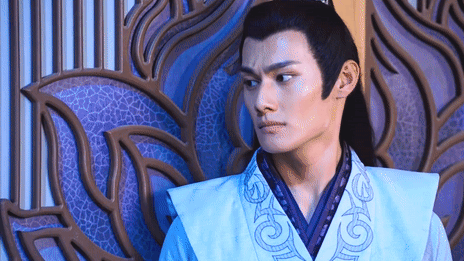
Special mention to the fish doorhandles on the main hall, as well. As a Pisces, this brings me joy.
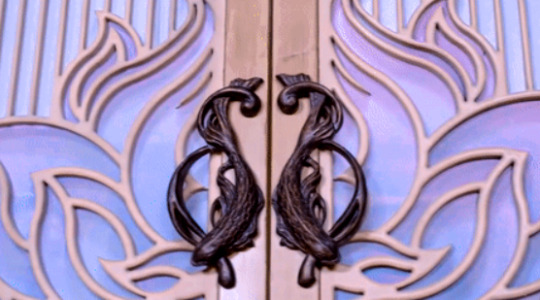
And finally, some reference shots for the gate:

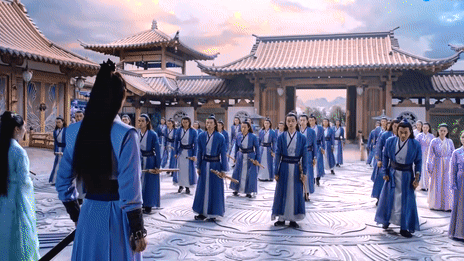
As always, thank you everyone for your continued support and encouragement - and your patience! Lotus Pier was a massive project, that has taken me over a year to complete. I am so proud to finally present it to you, and bring you the news that I have finally opened a print shop! As always, you can also buy me a coffee on kofi to show you support.
#nikkidraws#lotus pier#set design saga#cql set design#the untamed set design#lianhua wu#yunmeng jiang sect#yunmeng jiang#jiang cheng#jiang yanli#wei wuxian#yunmeng siblings#yunmeng brothers#twin prides#twin prides of yunmeng#set design#cql fanart#cql fan art#the untamed fanart#the untamed fan art#cql meta#the untamed meta#set analysis#character analysis#wwx analysis#cql wwx#chinese architecture#fantasy architecture#fantasy map#fantasy set design
1K notes
·
View notes
Text
Round 1 of 6, Group 1 of 4
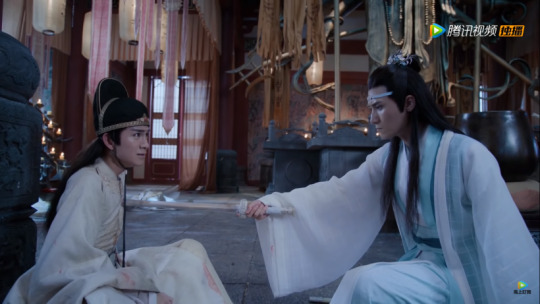
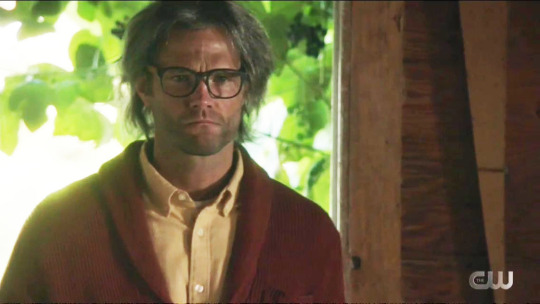
Propaganda is under the cut (671 words) - may contain spoilers
summaries (pulled from imdb or wikis)
propaganda
Chén Qíng Lìng/The Untamed - 1.50 Episode 50
The mastermind who plans everything has appeared. He's not someone who wouldn't think he would be the one who is behind everything, including Wei Wuxian's comeback. Who would that be?
I nominate this final on grounds of CCP information control, censorship and homophobia. They were so scared of the power of wangxian that they ended up banning ao3 in china and in the show they have to inexplicably have them part ways just to hammer home the no-homo. Plus the show is just kind of objectively bad.... but it rewires your brain all the same
Supernatural - 15.20 Carry On
cw: suicide
After Chuck is defeated and someone takes his place, Sam and Dean go about their life of hunting, but things don't turn out as expected.
1) you know why
2) god. where do i fucking start. this episode completely ignores this large cast of characters that were considered family in order to make it the "just two brothers" show again, scrapping basically every shred of character development shown throughout the course of the show, cutting out incredibly important characters at the last second (i.e. eileen being replaced with blurry wife for no fucking reason, cas not being there at all despite the whole love confession/ dying for dean that happened just two episodes before). in the penultimate episode the boys fight god. the finale? a random vampire from an episode of season one, who up until this point had never been mentioned again. then we have Dean being impaled on a very phallic looking spike and, after a speech about it just being about the brothers, dies. he then goes to heaven, where his father figure tells him his abusive dad is just down the road. he hops in his car (also in heaven, somehow) and drives for the next 60 odd years waiting for Sam to die. meanwhile, sam is moving on with blurry wife and i shown with a son named dean (as seen stitched onto his clothes), and we eventually see sam, now old and clad in the crustiest looking wig i have ever seen, die in the hospital. he goes to heaven, meets Dean on a bridge, and the last shot is the entire cast and crew on the bridge saying goodbye, completely shattering the fourth wall because fuck it, who cares anymore. and this isn't even mentioning everything that happened after. just an absolute mess the whole way through.
3) Random villain from season 1 kills one of the main characters, he goes to heaven and drives around while the other main character gets a montage of growing old a horrible wig. And that's not even all.
4) It abandoned 15 years of series theme and character growth, veered away from the natural story line and failed to resolve major plot threads. Dean deserved better, and so did Cas. See also Jared's terrible wig, Dean jr, Dean driving through heaven for five minutes...
5) Dean dies in the most anticlimactic way, cheap wig, blurry wife
6) There was no Castel :(
7) I mean...
8) destroyed every character arc in one fell swoop. the guy who tried to kill himself and struggled with depression throughout the show ended up killing himself anyway! was cas’s death even important? who was blurry wife? why was the absolute ugliest toddler imaginable cast to play Sam’s son? but in order to truly grasp how decimating this finale was, you have to understand the queerbaiting between 15.18 and the finale. why did Misha post that pic in the onion field with Uriel. why was Misha originally credited to be in 19 episodes of the final season on IMDb. why was . Hrrgghh.
9) Do I even need to write propaganda for this one? Even though it was the series finale we are still here after 3 years 😂 Title said 'carry on', but the fandom said 'nah, time for season 16'.
10) Bad old man makeup and no castiel
11) Everything had been neatly wrapped up in the previous episode. Then they decided "Hey you know what would be great? If we just killed one of the main characters." They killed him for no reason. He deserved to live a full life, have a family, retire, but nope! He met his match in a RUSTY NAIL. Not to mention that there were terrible wigs, blurry wives, and subtextual incest vibes involved.
+ After it aired, one of the actors unfollowed everyone who had anything to do with the episode.
87 notes
·
View notes
Text
Happy June 27!
Here’s to four years of Chén Qíng Lìng 💙

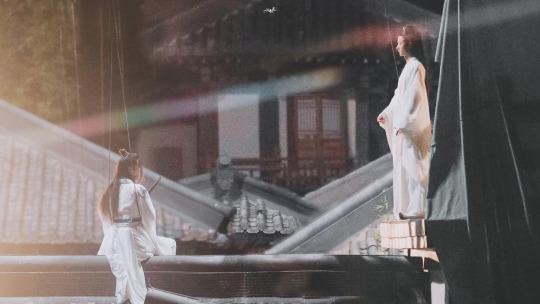
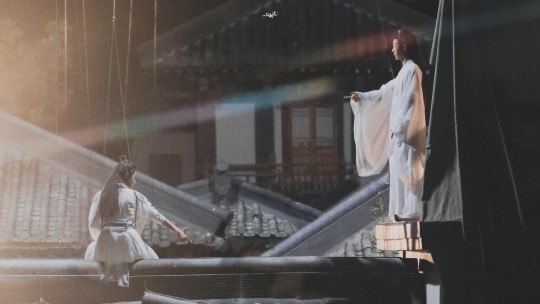


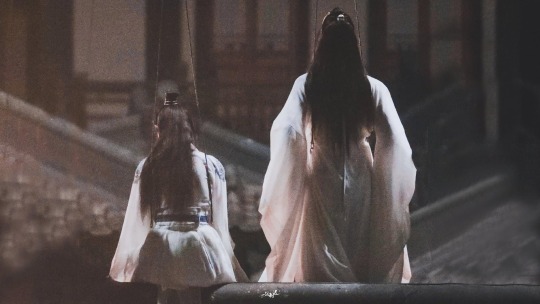

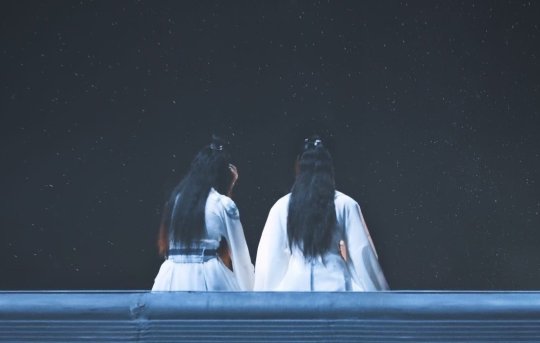
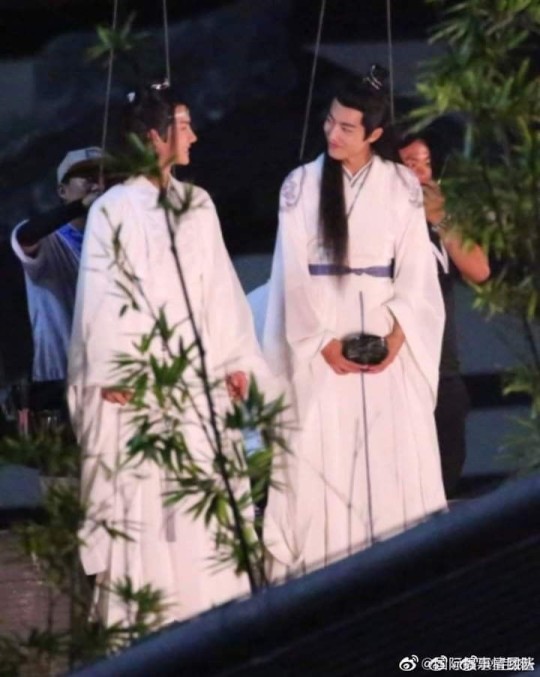

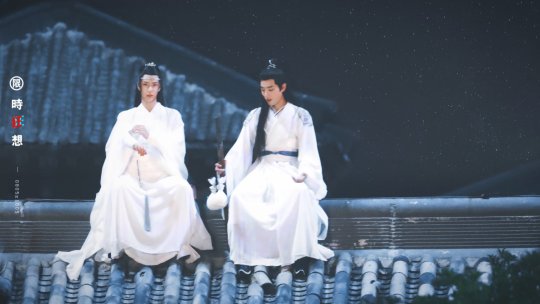
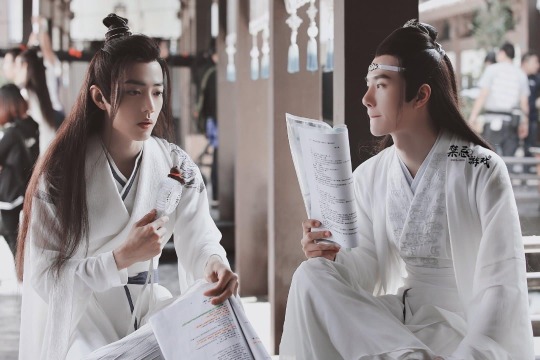
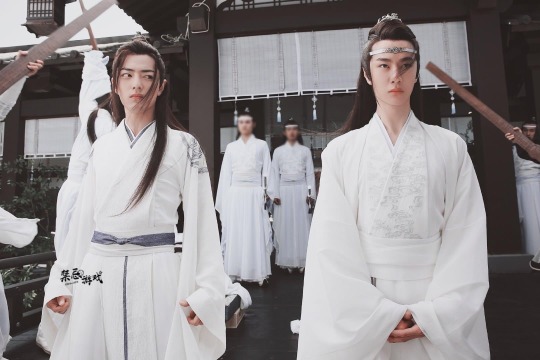
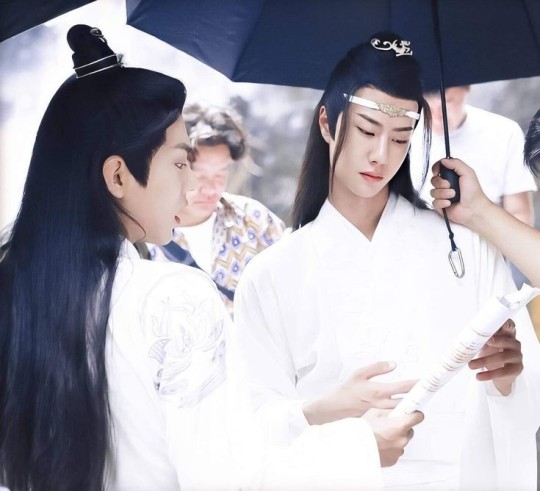


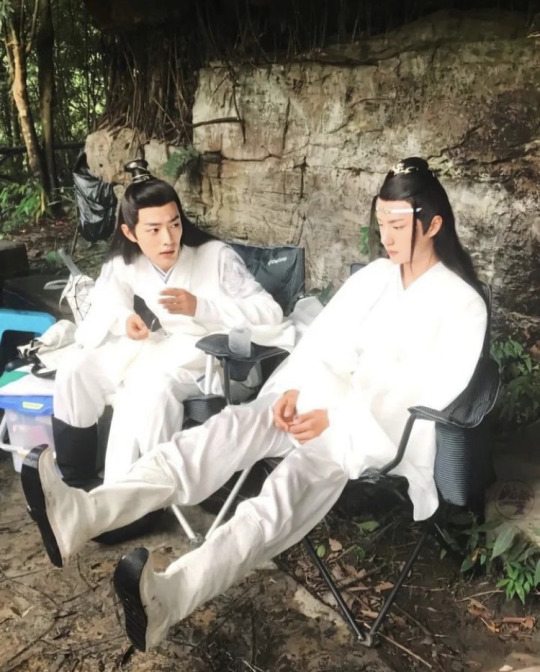

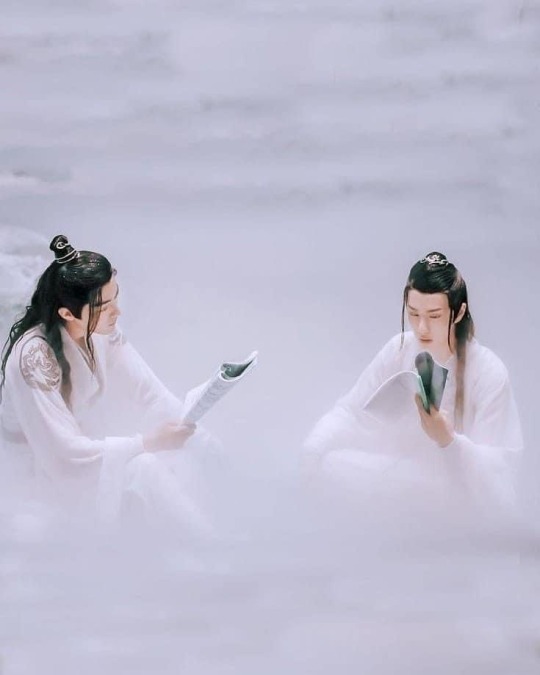

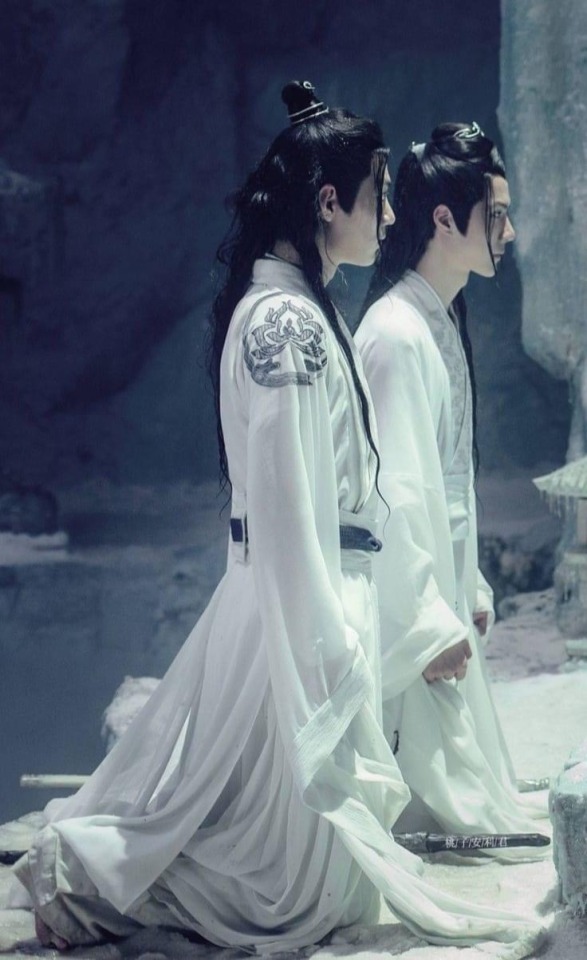
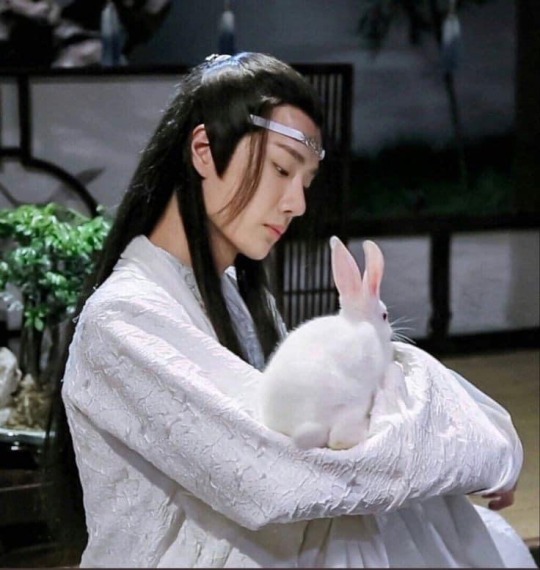

#wang yibo#the untamed#cql#lan wangji#wangxian#lan zhan#mdzs#wei wuxian#xiao zhan#Happy anniversary to the untamed#Happy 627#yizhan#untamed bts#the untamed bts#chen qing ling#Chen qing ling bts#hanguang jun
132 notes
·
View notes
Text
Meaning of 陈情 Chenqing
This is going to be a rehash of the old Taming Wangxian footnotes, but I’ll be adding a little more.
The term 陈情 Chenqing has two meanings. The first would be to reminisce past relationship (former friendship), and the second would be to provide a full account of (an issue).
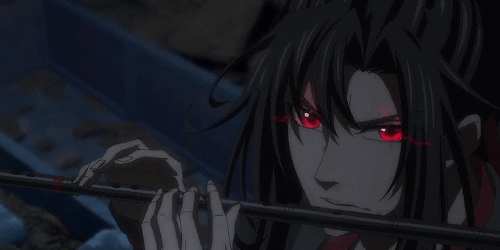
To gain further context about this term, let us look at where it originated from. It was first originated from Wenxuan (‘Selections of Refined Literature”) compiled by 萧统 Xiao Tong, the Crown Prince of the Liang Dynasty. In the Wenxuan, there is a segment called the 陈情表 Chenqing Memorial (to the throne), which is a letter written by Li Mi, a scholar of the Western Jin Dynasty to the Emperor Wu of Jin. The Emperor Wu of Jin had employed him to work in the palace stables but Li Mi wanted to take care of his elderly grandmother. His father died, his mother remarried and he lived with his grandmother. So he wrote this heartfelt letter about his family circumstances and the hardship that he’s facing. (It’s basically a resignation letter lol). The story didn’t end well and he was removed from his post, defamed and he died at home.
This term is also used in the modern context of confessing before a court. Hence, a 陈情 Chenqing is almost like a plea of sorts. It fits so well as firstly, Wei Wuxian is essentially treated like a criminal throughout the entire book and everyone in the series expects a “confession” from him. The confrontation at Nightless City was almost like a court that wanted to trial him. And secondly, from the historical context of the word, it could have hinted that it wouldn’t make a different no matter what he said and he wouldn’t have ended well.
陈情 and 随便 are commonly thought to depict the shift in Wei Wuxian’s character. 随便 (suí biàn) represents his youth; he is carefree, relaxed and without worry. 陈情 on the other hand, is a depiction of his loss and loneliness. Chenqing was created from his time in the Burial Mounds - it’s a turning point for him because at this juncture, he had no means to give his own account or prove his “innocence”, simply because he has walked the demonic path. He’s unable to tell his loved ones that he lost his jindan, and as much as he misses his past relationships, he’s unable to relive them because he’s labelled a “demonic” Yiling Laozu.
An interesting titbit can be found in the title of the Untamed, 陈情令 (chén qíng lìng). There are two possible interpretations to this.
(i) The main focus of the story is on Wei Wuxian and his character growth, hence placing 陈情 in the title puts the emphasis on him.
(ii) 陈情一曲令天下 (chén qíng yī qū lìng tiān xià) - According to a forum, the producers have used this line to describe the drama’s title. It can be translated to, “a song from Chenqing commands the world”, aptly depicting Chenqing’s power.
335 notes
·
View notes
Photo
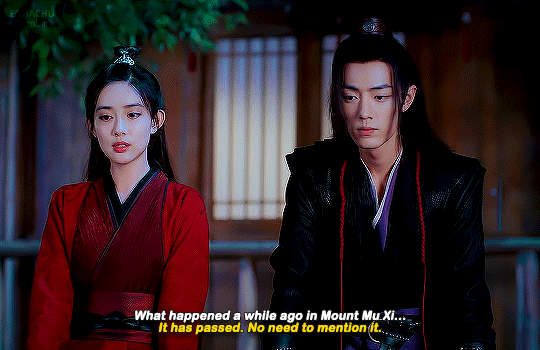
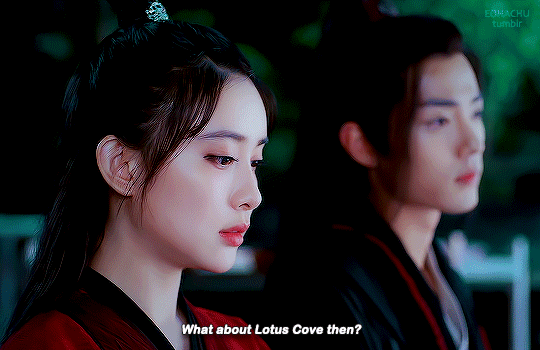
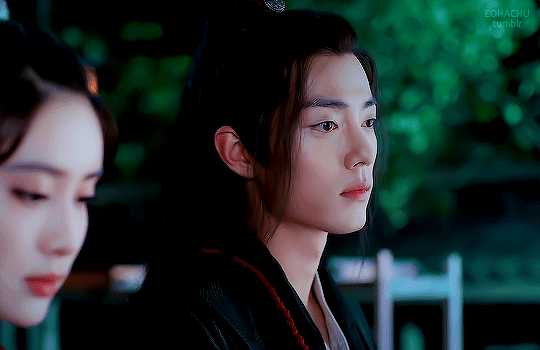

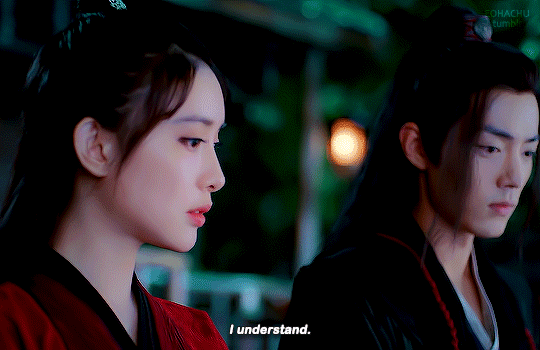




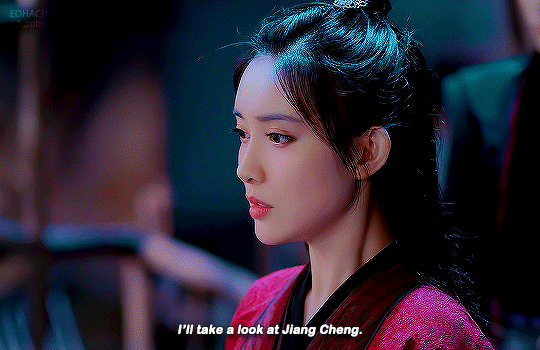
《陈情令》 Chén Qíng Lìng (2019) Ep. 17 ⨳ 温情 Wen Qing & 魏无羡 Wei Wuxian
#the untamed#mdzswomen#asiandramanet#cqledit#asianlgbtqdramas#mdzsedit#cdramaedit#mdzsnet#chineseartistsinc#cdrama#chinesemedia#asiandramasource#vishingwell#tuserashinlae#userfra#/ listen idk why i suddenly wanted to gif this ok.#/ i just know that unusual times require unusual colourings <3#wen qing#wei wuxian#r.gif#*mine#*mine:cql#chen qing ling 2019
434 notes
·
View notes
Text
陈情令 | The Untamed/Chén Qíng Lìng | ʈʂʰən˧˥ tɕʰiŋ˧˥ liŋ˥˩ | ʈʂə́n chéeng lèeng
(ɖˠiɪn dziᴇŋ liᴇŋᴴ | ɖeen dzyeng lyèng)
魔道祖师 | Grandmaster of Demonic Cultivation/Mó Dào Zǔ Shī | muɔ˧˥ tɑʊ˥˩ tsu˨˩˦‧ʂʐ̩˥˥ | mwó tàhw tsǒo-ʂʐ̄
(muɑ dɑuˣ tsuoˣ‧ʃˠiɪ | mwah dáhw tswó-shee)
When I get into foreign media, one of the first things I do is study the names. Because being a nerd is fun.
My friend is writing extremely good Untamed fanfic, so I've spent the last week trying to figure out how to pronounce Mandarin. And then, despite the fact that y'all can just LISTEN to the show to hear the pronunciation, I decided to share my new knowledge.
I'm a historical linguist (I study how languages might have been spoken in the past) so I'm also including how these names might have been pronounced in Middle Chinese (4th-12th C).
We don't know exactly how things were pronounced then. But this story is set in vaguely historical fantasy China, so I want it to have some vaguely historical names.
Explanation of the symbols afterwards.
The Names
Hanzi (Chinese Characters) | English Translation/Pinyin | IPA (Phonetic transcription of sounds) | Respelling (Phonetic Transcription designed to be easier to understand for English speakers)
(Middle Chinese Reconstruction: IPA | Respelling)
魏无羡 | Wèi Wúxiàn | weɪ˥˩ u˧˥‧ɕiɛn˥˩ | wày óo-shyèn
(ŋʉiᴴ mɨo‧ziᴇnᴴ | ngwèe myo-zyèn)
魏婴 | Wèi Yīng | weɪ˥˩ iŋ˥˥ | wày ēeng
(ŋʉiᴴ ʔiᴇŋ | ngwèe yeng)
夷陵老祖 | Yílíng Lǎozǔ | i˧˥‧liŋ˧˥ lɑʊ˨˩˦‧tsu˨˩˦ | ée-léeng lǎhw-tsǒo
(jiɪ‧lɨŋ lɑuˣ.tsuoˣ | yee-leeng láhw-tswó)
His Sword: 随便 | Suíbiàn sword | sueɪ˧˥‧piɛn˥˩| swáy-pyèn
(ziuᴇ‧biᴇnᴴ | zywe-byèn)
His Flute: 陈情 | Chénqíng flute | ʈʂʰən˧˥‧tɕʰiŋ˧˥ | ʈʂə́n-chéeng
(ɖˠiɪn‧dziᴇŋ | ɖeen-dzyeng)
His Amulet: 阴虎符 | Stygian Tiger Amulet | in˥˥‧xu˨˩˦‧fu˧˥ | ēen-xǒo-fóo
(ʔˠiɪm‧huoˣ‧bɨo | eem-hwó-byo)
蓝忘机 | Lán Wàngjī | län˧˥ wɑŋ˥˩‧tɕi˥˥ | lán wàhng-chēe
(lɑm mʉɐŋᴴ‧kɨi | lahm mwùhng-kee)
蓝湛 | Lán Zhàn | län˧˥ ʈʂän˥˩ | lán ʈʂàn
(lɑm ɖˠɛmˣ | lahm ɖém)
含光君 | Hánguāng-Jūn | xän˧˥‧kuɑŋ˥˥ tɕyn˥˥ | xán-kwāhng chēeᵘn
(ɦʌm‧kwɑŋ kɨun | hhuhm-kwahng kyoon)
His Sword: 避尘 | Bìchén sword | pi˥˩‧ʈʂʰən˧˥ | pèe-ʈʂə́n
(biᴇᴴ‧ɖˠiɪn | byè-ɖeen)
His Guqin: 忘机 | Wàngjī gǔqín | wɑŋ˥˩‧tɕi˥˥ ku˨˩˦‧tɕʰin˧˥ | wàhng-chēe kǒo-chéen
(mʉɐŋᴴ‧kɨi | mwùhng-kee)
姑苏蓝氏 | Gusu Lan Clan | ku˥˥‧su˥˥‧län˧˥ ‧ʂʐ̩˥˩ | kōo-sōo lán ʂʐ̀
(kuo‧suo‧lɑm dʑiᴇˣ | kwo-swo lahm jyé)
云深不知处 | Cloud Recesses | yn˧˥‧ʂən˥˥‧pu˥˩‧ʈʂʐ̩˥˥‧ʈʂʰu˨˩˦ | éeᵘn-ʂə̄n-pòo ʈʂʐ̄-ʈʂǒo
(ɦɨun‧ɕiɪm‧pɨu‧ʈiᴇ‧tɕʰɨʌˣ | hhyoon-sheem-pyoo ʈye-chyúh)
蓝曦臣 | Lán Xīchén | län˧˥ ɕi˥˥‧ʈʂʰən˧˥ | lán shēe-ʈʂə́n
(lɑm hˠiᴇ‧dʑiɪn | lahm hye-jeen)
蓝涣 | Lán Huàn | län˧˥ xuän˥˩ | lán xwàn
(lɑm huɑnᴴ | lahm hwàhn)
泽芜君 | Zéwú-Jūn | tsɤ˧˥‧u˧˥ tɕyn˥˥ | tsóʸ-óo chēeᵘn
(ɖˠæk‧mɨo kɨun | ɖak-myo kyoon)
His Sword: 朔月 | Shuòyuè Sword (New Moon) | ʂuɔ˥˩‧ɥɛ˥˩ | ʂwò-yᵘè
(ʃˠʌk‧ŋʉɐt | shuhk-ngwuht)
His Flute: 裂冰 | Lièbīng flute | liɛ˨˩˦‧piŋ˥˥ | lyě-pēeng
(liᴇt‧pɨŋ | lyet-peeng)
蓝思追 | Lán Sīzhuī | län˧˥ sz̩˥˥‧ʈʂuei˥˥ | lán sz̄-ʈʂwāy
(lɑm sɨ‧ʈˠiuɪ | lahm see-ʈywee)
蓝愿 | Lán Yuàn | län˧˥ ɥɛn˥˩ | lán yᵘèn
(lɑm ŋʉɐ̀n | lahm ngwuhn)
温苑 | Wēn Yuàn | wən˥˥ ɥɛn˥˩ | wə̄n yᵘèn
(ʔuən ʔʉɐnˣ | wən wúhn)
蓝启仁 | Lán Qǐrén | län˧˥ tɕʰi˨˩˦‧ʐən˧˥ | lán chěe-ʐə́n
(lɑm kʰeiˣ‧ȵiɪn | lahm káy ñen)
青蘅君 | Qīnghéng Jūn | tɕʰiŋ˥˥‧xɤŋ˧˥ tɕyn˥˥ | chēeng-xóʸng chēeᵘn
(tsʰeŋ‧ɦˠæŋ kɨun | tsaeng-hhang kyoon)
蓝景仪 | Lán Jīngyí | län˧˥ tɕiŋ˨˩˦‧i˧˥ | lán chěeng-ée
(lɑm kˠiæŋˣ‧ŋˠiᴇ | lahm kyáng-ngye)
蓝翼 | Lán Yì | län˧˥ i˥˩ | lán èe
(lɑm jɨk | lahm yeek)
云梦江氏 | Yúnmèng Jiāng Clan | yn˧˥‧mɤŋ˥˩‧tɕiɑŋ˥˥ ‧ʂʐ̩˥˩ | éeᵘn-mòʸng chyāhng ʂʐ̀
(ɦɨun‧mɨuŋᴴ kˠʌŋ dʑiᴇˣ | hhyoon-myòong kuhng jyé)
江厌离 | Jiāng Yànlí | tɕiɑŋ˥˥ jɛn˥˩‧li˧˥ | chyāhng yèn-lée
(kˠʌŋ ʔiᴇmᴴ‧liᴇ | kuhng yèm-lye)
江晚吟 | Jiāng Wǎnyín | tɕiɑŋ˥˥ wän˨˩˦‧in˧˥ | chyāhng wǎn-éen
(kˠʌŋ mʉɐnˣ‧ŋˠiɪm | kuhng mwúhn-ngeem)
江澄 | Jiāng Chéng | tɕiɑŋ˥˥ ʈʂʰɤŋ˧˥ | chyāhng ʈʂóʸng
(kˠʌŋ ɖɨŋ | kuhng ɖeeng)
三毒圣手 | Sāndú Shèngshǒu | sän˥˥‧tu˧˥ ʂɤŋ˥˩‧ʂoʊ˨˩˦ | sān-tóo ʂòʸng-ʂǒw
(sɑm‧duok‧ɕiᴇŋᴴ‧ɕɨuˣ | sahm-dwoek shyèng-shyóo)
His Sword: 三毒 | Sāndú Sword (3 Poison) | sän˥˥‧tu˧˥ | sān-tóo
(sɑm‧duok | sahm-dwok)
His Ring: 紫电 | Zǐdiàn Ring (Purple Lightning) | tsz̩˨˩˦‧tiɛn˥˩ | tsž-tyèn
(tsiᴇˣ‧denᴴ | tsyé-dàen)
江枫眠 | Jiāng Fēngmián | tɕiɑŋ˥˥ fɤŋ˥˥‧miɛn˧˥ | chyāhng fōʸng-myén
(kˠʌŋ pɨuŋ‧men | kuhng pyoong-maen)
虞紫鸢 | Yú Zǐyuān | y˧˥ tsz̩˨˩˦‧ɥɛn˥˥ | éeᵘ tsž-yᵘēn
(ŋɨo tsiᴇˣ‧jiuᴇn | ngyo tsyé-ywen)
虞夫人 | Madame Yu | y˧˥ fu˥˥‧ʐən˧˥ | éeᵘ fōo-ʐə́n
(ŋɨo pɨo‧ȵiɪn | ngyo pyo-ñeen)
三娘 | Sān Niáng (3rd Sister) | sän˥˥‧niɑŋ˧˥ | sān-nyáhng
(sɑm‧ɳɨɐŋ | sahm-ɳyuhng)
紫蜘蛛 | Violet Spider | tsz̩˨˩˦ ‧ʈʂʐ˥˥‧ʈʂu˥˥ | tsž ʈʂʐ̄-ʈʂōo
(tsiᴇˣ‧ʈiᴇ‧ʈɨo | tsyé ʈye-ʈyo)
Her Ring: 紫电 | Zǐdiàn Ring (Purple Lightning) | tsz̩˨˩˦‧tiɛn˥˩ | tsž-tyèn
(tsiᴇˣ‧denᴴ | tsyé-dàen)
魏长泽 | Wèi Chángzé | weɪ˥˩ ʈʂʰɑŋ˧˥‧tsɤ˧˥ | wày ʈʂáhng-tsóʸ
(ŋʉiᴴ ɖɨɐŋ‧ɖˠæk | ngwèe ɖyuhng-ɖak)
藏色散人 | Cángsè Sǎnrén | tsʰɑŋ˧˥‧sɤ˥˩ sän˨˩˦‧ʐən˧˥ | tsáhng-sòʸ sǎn-ʐə́n
(dzɑŋ‧ʃɨk sɑnˣ‧ȵiɪn | dzahng-sheek sáhn-ñeen)
兰陵金氏 | Lánlíng Jīn Clan | län˧˥‧liŋ˧˥‧tɕin˥˥‧ʂʐ̩˥˩ | lán-léeng chēen ʂʐ̀
(lɑn‧lɨŋ kˠiɪm dʑiᴇˣ | lahn-leeng keem jyé)
金光瑶 | Jīn Guāngyáo | tɕin˥˥ kuɑŋ˥˥‧ jɑʊ˧˥ | chēen kwāhng-yáhw
(kˠiɪm kwɑŋ‧jiᴇu | keem kwahng-yew)
孟瑶 | Mèng Yáo | mɤŋ˥˩ jɑʊ˧˥ | mòʸng yáhw
(mˠæ̀ŋ jiᴇu | màng yew)
敛芳尊 | Liǎnfāng-Zūn | liɛn˨˩˦‧fɑŋ˥˥ tsuən˥˥ | lyěn-fāhng tswə̄n
(liᴇ́m‧pʰʉɐŋ tsuən | lyem-pwuhng tswən)
His Sword: 恨生 | Hènshēng Sword | xən˥˩‧ʂɤŋ˥˥ | xə̀n-ʂōʸng
(ɦənᴴ‧ʃˠæŋ | hhə̀n-shang)
金如兰 | Jīn Rúlán | tɕin˥˥ ʐu˧˥‧län˧˥ | chēen ʐóo-lán
(kˠiɪm ȵɨʌ‧lɑn | keem ñyuh-lahn)
金凌 | Jīn Líng | tɕin˥˥ liŋ˧˥ | chēen léeng
(kˠiɪm lɨŋ | keem leeng)
His Sword: 岁华尊 | Suìhuá Sword | sueɪ˥˩‧xuä˧˥ tsuən˥˥ | swày-xwá tswə̄n
(siuᴇiᴴ‧ɦˠua‧tsuən | sywày-hhwa tswən)
江厌离 | Jiāng Yànlí | tɕiɑŋ˥˥ jɛn˥˩‧li˧˥ | chyāhng yèn-lée
(kˠʌŋ ʔiᴇmᴴ‧liᴇ | kuhng yèm-lye)
金光善 | Jīn Guāngshàn | tɕin˥˥ kuɑŋ˥˥‧ʂän˥˩ | chēen kwāhng-ʂàn
(kˠiɪm kwɑŋ‧dʑiᴇnˣ | keem kwahng-jyén)
秦愫 | Qín Sù | tɕʰin˧˥ su˥˩ | chéen sòo
(dziɪn suoᴴ | dzeen swò)
金子轩 | Jīn Zǐxuān | tɕin˥˥ tsz̩˨˩˦‧ɕyɛn˥˥ | chēen tsz-shyᵘēn
(kˠiɪm tsɨˣ‧hɨɐn | keem tsée-hyuhn)
金子勋 | Jīn Zǐxūn | tɕin˥˥ tsz̩˦˥‧ɕyn˥˥ | chēen tsz-shēeᵘn
(kˠiɪm tsɨˣ‧hɨun | keem tsée-hyoon)
莫玄羽 | Mò Xuányǔ | muɔ˥˩ ɕyɛn˧˥‧y˨˩˦ | mwò shyᵘén-ěeᵘ
(mɑk ɦwen‧ɦɨoˣ | mahk hhwaen-hhyó)
罗青羊 | Luó Qīngyáng | luɔ˧˥ tɕʰiŋ˥˥‧jɑŋ˧˥ | lwó chēeng-yáhng
(lɑ tsʰeŋ‧jɨɐŋ | lah tsaeng-yuhng)
绵绵 | Mián Mián | miɛn˧˥‧miɛn˧˥ | myén-myén
(miᴇn‧miᴇn | myen-myen)
金阐 | Jīn Chǎn | tɕin˥˥ ʈʂʰän˨˩˦ | chēen ʈʂǎn
(kˠiɪm tɕʰiᴇnˣ | keem chyén)
清河聂氏 | Qīnghé Niè Clan | tɕʰiŋ˥˥‧xɤ˧˥‧niɛ˥˩‧ʂʐ̩˥˩ | chēeng-xóʸ nyè ʂʐ̀
(tsʰiᴇŋ‧ɦɑ‧ɳˠiᴇp‧dʑiᴇˣ | tsyeng-hhah ɳyep jyé)
聂明玦 | Niè Míngjué | niɛ˥˩ miŋ˧˥‧tɕyɛ˧˥ | nyè méeng-chyᵘé
(ɳˠiᴇp mˠiæŋ‧kwet | ɳyep myang-kwaet)
赤锋尊 | Chìfēng-Zūn | ʈʂʰʐ̩˥˩‧fɤŋ˥˥ tsuən˥˥ | ʈʂʐ̀-fōʸng tswə̄n
(tɕʰiᴇk‧pʰɨoŋ‧tsuən | chyek-pyong tswən)
聂怀桑 | Niè Huáisāng | niɛ˥˩ xuaɪ˧˥‧sɑŋ˥˥ | nyè xwhý-sāhng
(ɳˠiᴇp ɦˠuɛi‧sɑŋ | ɳyep hhwey-sahng)
一问三不知 | Head Shaker ("1 Question, 3 'Don't Knows'") | i˥˥‧wən˥˩ sän˥˥‧pu˥˩‧ʈʂʐ̩˥˥ | ēe-wə̀n sān-pòo-ʈʂʐ̄
(ʔiɪt‧mɨunᴴ sɑm‧pɨu‧ʈiᴇ | eet-myòon sahm-pyoo-ʈye)
岐山温氏 | Qíshān Wēn Clan | tɕʰi˧˥‧ʂän˥˥‧wən˥˥‧ʂʐ̩˥˩ | chée-ʂān wə̄n ʂʐ̀
(giᴇ‧ʃˠɛn‧ʔuən‧dʑiᴇˣ | gye-shen wən jyé)
温琼林 | Wēn Qiónglín | wən˥˥ tɕʰiʊŋ˧˥‧lin˧˥ | wə̄n chyúng-léen
(ʔuən gwiᴇŋ‧liɪm | wən gwyeng-leem)
温宁 | Wēn Níng | wən˥˥ niŋ˧˥ | wə̄n néeng
(ʔuən neŋ | wən naeng)
鬼将军 | Guǐjiāng-Jūn | kueɪ˨˩˦‧tɕiɑŋ˥˥‧tɕyn˥˥ | kwǎy-chyāhng chēeᵘn
(kʉiˣ‧tsɨɐŋ kɨun | kwée-tsyuhng kyoon)
温情 | Wēn Qíng | wən˥˥ tɕʰiŋ˧˥ | wə̄n chéeng
(ʔuən dziᴇŋ | wən dzyeng)
温若寒 | Wēn Ruòhán | wən˥˥ ʐuɔ˥˩‧xän˧˥ | wə̄n ʐwò-xán
(ʔuən ȵɨɐk‧ɦɑn | wən ñyuhk-hhahn)
温旭 | Wēn Xù | wən˥˥ ɕy˥˩ | wə̄n shèeᵘ
(ʔuən hɨok | wən hyok)
温晁 | Wēn Cháo | wən˥˥ ʈʂʰɑʊ˧˥ | wə̄n ʈʂáhw
(ʔuən ɖˠiᴇu | wən ɖyew)
温逐流 | Wēn Zhúliú | wən˥˥ ʈʂu˧˥‧lioʊ˧˥ | wə̄n ʈʂóo-lyów
(ʔuən ɖɨuk‧lɨu | wən ɖyook-lyoo)
赵逐流 | Zhào Zhúliú | ʈʂɑʊ˥˩ ʈʂu˧˥‧lioʊ˧˥ | ʈʂàhw ʈʂóo-lyów
(ɖˠiᴇuˣ ɖɨuk‧lɨu | ɖyéw ɖyook-lyoo)
化丹手 | Core-Melting Hand | xuä˥˩‧tän˥˥‧ʂoʊ˨˩˦ | xwà-tān ʂǒw
(hˠuaᴴ‧tɑn‧ɕɨuˣ | hwà-tahn shyóo)
王灵娇 | Wáng Língjiāo | wɑŋ˧˥ liŋ˧˥‧tɕiɑʊ˥˥ | wáhng léeng-chyāhw
(ɦʉɐŋ leŋ‧kˠiᴇu | hhwuhng laeng-kyew)
Others
抱山散人 | Bàoshān Sǎnrén | pɑʊ˥˩‧ʂän˥˥ sän˨˩˦‧ʐən˧˥ | pàhw-ʂān sǎn-ʐə́n
(bɑuˣ‧ʃˠɛn sɑnˣ‧ȵiɪn | báhw-shen sáhn-ñeen)
欧阳子真 | Ōuyáng Zǐzhēn | ʔoʊ˥˥‧jɑŋ˧˥ tsz̩˦˥‧ʈʂən˥˥ | ōw-yáhng tsź-ʈʂə̄n
(ʔəu‧jɨɐŋ tsɨˣ‧tɕiɪn | əw-yuhng tsée-cheen)
-
SYMBOLS USED
Pinyin (English translation) | IPA symbols | Respelling | English Example
m | m | m | mind
n | n | n | need
N/A | ɳ | ɳ | 'need' with tip of tongue curled up
N/A | ȵ | ñ | canyon
ng | ŋ | ng | sing
N/A | b | b | bat
b | p | p | keep
p | pʰ | p | peek
N/A | d | d | deep
d | t | t | cat
t | tʰ | t | tack
N/A | ɖ | ɖ | 'deep' with tip of tongue curled up
N/A | ʈ | ʈ | 'cat' with tip of tongue curled up
N/A | g | g | goat
g | k | k | peek
k | kʰ | k | keep
N/A | ʔ | none | uh-oh (sound made in English when two vowels need to stay separate, and neither is a 'i' or 'u')
N/A | dz | dz | beds
z | ts | ts | cats
c | tsʰ | ts | tsunami
zh | ʈʂ | ʈʂ | 'cats' with tip of tongue curled up
ch | ʈʂʰ | ʈʂ | 'tsunami' with tip of tongue curled up
N/A | dʑ | j | jump (hold tongue like a 'y' then say 'j')
j | tɕ | ch | pitch (hold tongue like a 'y' then say 'ch')
q | tɕʰ | ch | check (hold tongue like a 'y' then say 'ch')
f | f | f | fig
s | s | s | sit
sh | ʂ | ʂ | 'sit' with tip of tongue curled up
x | ɕ | sh | ship (hold tongue like a 'y' then say 'sh')
h | x | x | loch
N/A | h | h | help
N/A | ɦ | hh | help with slightly more air
l | l | l | lamp
r | ʐ or ɻ | ʐ | 'zip' with tip of tongue curled up
y | j | y | yes
yu | ɥ | yᵘ | you ('y' with lips rounded like you're saying a 'w' or 'u')
w | w | w | wet
-
Vowels
i | i, ɨ, iɪ, ɨi | ee or y | see (Can/Amer/Brit/Aus)
i | z̩ | z | bzzz (Can/Amer/Brit/Aus)
i | ʐ̩ | ʐ̩ | bzzz with tip of tongue curled up (Can/Amer/Brit/Aus)
u | ɥ, y | eeᵘ or yᵘ | lips say 'sue', mouth says 'see'(Can/Amer/Brit/Aus) ⁹
u | u | oo or w | threw (Can/Amer/Brit/Aus)
u | uə | wə | threw up(Can/Amer/Brit/Aus)
N/A | ʉi | wee | weak(Can/Amer/Brit/Aus)
N/A | ɨo | yo | yore(Can/Amer/Brit/Aus)
iu | ioʊ | yow | yoke (Amer/Can), between yore and yoke (Brit/Aus)
io | iʊ, ɨu | yoo | pure (Amer/Can), cute (Brit/Aus)
o | uo, uɔ | wo | wart (Can/Amer/Brit/Aus)
N/A | əu | əw | about (Can), starting as 'comma', ending as 'goat' (Amer) , no (Brit/Aus)
ou | oʊ | ow | soul(Can/Amer/Brit/Aus)
a | ä, æ | a | lad(Can/Amer/Brit/Aus)
a | ɑ | ah | arm (Can), palm (Amer/Brit), my without the 'e' (Aus)
N/A | ʌ | uh | run (Amer/Can/Brit), 'comma' (Aus)
a | ɛ | e | bed (Can/Amer/Brit), between 'lad' and 'led' (Aus)
ao | ɑʊ, ɑu | ahw | now (Can), 'palm' + 'w' (Amer/Brit), starting as 'my', ending as 'soul' (Aus)
N/A | ɨæ | ya | yap(Can/Amer/Brit/Aus)
ia, ya | iɑ | yah | yard (Can/Amer/Brit), yikes without the 'e' (Aus)
ia, ie | iɛ, iᴇ | ye | yes (Can/Amer/Brit), between 'yap' and 'yep' (Aus)
N/A | ɨʌ, ɨɐ, jɨɐ | yuh | yuck (Can/Amer/Brit/Aus)
yua, ua | ɥɛ, yɛ | yᵘe | lips say 'wet', mouth says 'yet' (Can/Amer/Brit), lips say wet, mouth says between 'yap' and 'yet' (Aus)
iao | iɑʊ | yahw | yard + 'w' (Can/Amer/Brit), yikes + 'w' (Aus)
N/A | ɨæ | ya | yap(Can/Amer/Brit/Aus)
ua | uä, ua | wa | wack(Can/Amer/Brit/Aus)
ua | uɑ, wɑ | wah | warm (Can/Amer/Brit), white (Aus)
N/A | ʉɐ | wuh | won(Can/Amer/Brit/Aus)
uai | uaɪ | why | wide (Amer/Can) wack + 'y' (Brit), way (Aus)
N/A | uɛi | wey | wet + 'y' (Can/Amer/Brit), between 'way' and 'wed' (Aus)
e | ə | ə | comma (Can/Amer/Brit/Aus)
e | ɤ | oʸ | lips say 'wore', mouth says 'yore'(Can/Amer/Brit/Aus)
e | e | ae | day without 'y' (Can/Amer/Brit), bed (Aus)
ei | eɪ | ay | day (Can/Amer/Brit), bed + 'y' (Aus)
N/A | we | wae ¹⁰ | way without 'y' (Can/Amer/Brit), wed (Aus)
ui, wei | ueɪ, weɪ | way | way (Can/Amer/Brit) , wed + 'y' (Aus)
N/A | iᴇu, jiᴇu | yew | yes + 'w' (Can/Amer/Brit), between 'yap' and 'yep' + 'w' (Aus)
N/A | wiᴇ | wye | ??
N/A | iuɪ | ywee | ??
N/A | iuᴇ, jiuᴇ | ywe | ??
N/A | iuᴇi | ywey | ??
(The 'i's at the beginning of the last 3 are there to distinguish them from other sounds, but we don't actually know how they're pronounced. Same thing with all the extra 'j's and 'w's in the Middle Chinese transcriptions.)
-
Other Symbols
ˠ - say the sound while back of tongue is raised.
ᴴ, ˣ - the 2 marked tones of Middle Chinese (third 'tone' is syllables with 'p', 't', or 'k' at the end, final tone is unmarked). It's uncertain what they were, but the guess is 'ᴴ' was low and 'ˣ' was high.
ó, ò, ō, ǒ | ˧˥, ˥˩, ˥˥, ˨˩˦ - Modern Mandarin tones. I'm ADHD and can't hear my own tone and volume, so I am have no help for you.
39 notes
·
View notes
Photo
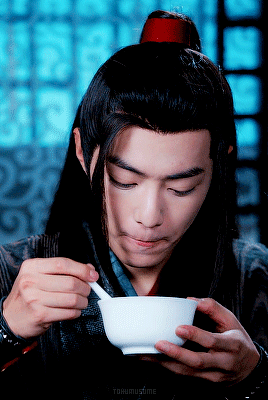
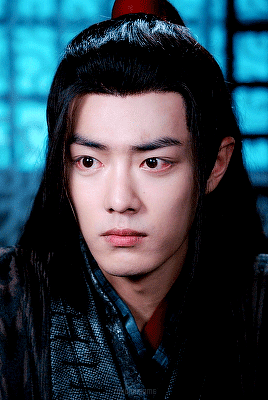

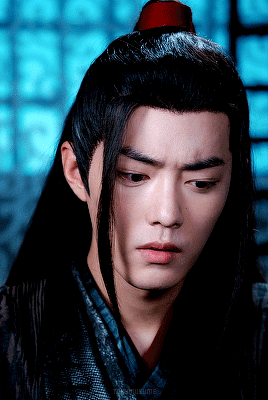
(\ (\
♡(⌒(_*• ω •)_
#The Untamed#Chén Qíng Lìng#CQL#Xiao Zhan#Wei Wuxian#cdrama#gif#tokumusume:gif#xianxian's pout appreciation post#red and blue look so good together
144 notes
·
View notes
Text
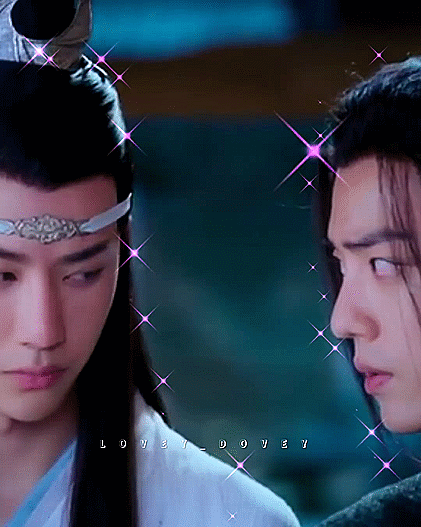

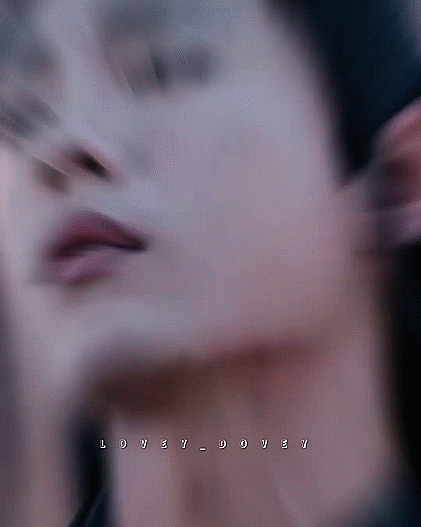

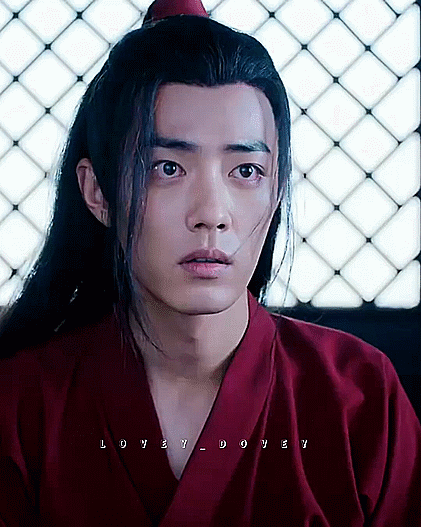
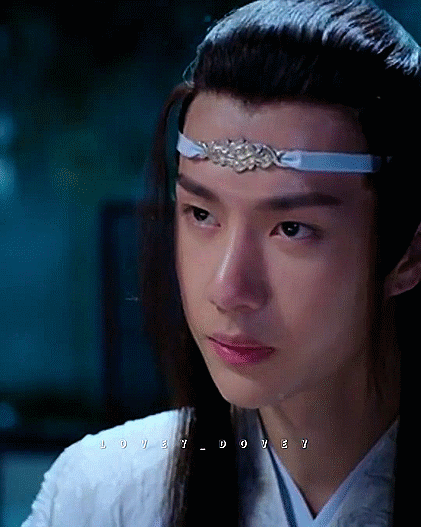
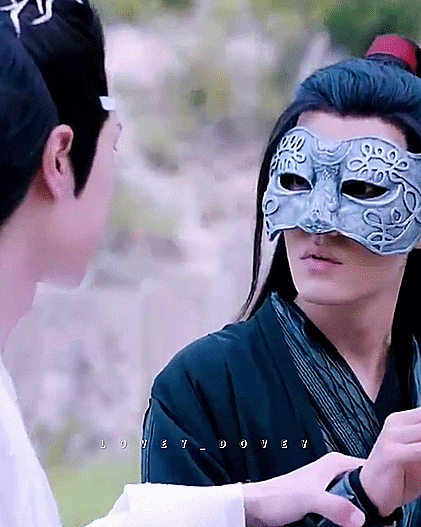
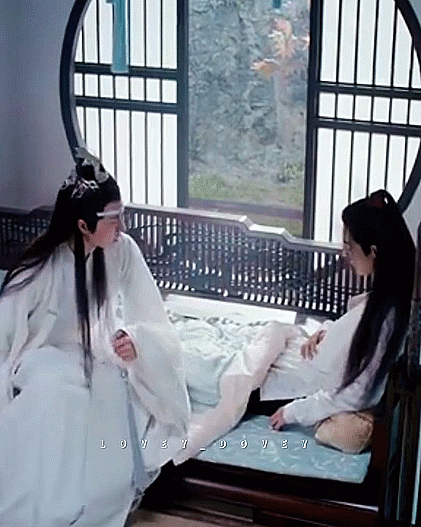
Cdrama: The Untamed (2019)
😻 kadhal sonna kaname 💞#theuntamed tamil edit #yizhan #wangxian #wangyibo #xiaozhan #cdrama #shorts
Watch this video on Youtube: https://www.youtube.com/shorts/VwnIEt9PJ9s
#The Untamed#陈情令#Grandmaster of Demonic Cultivation#The Founder of Diabolism#Mo Dao Zu Shi#MDZS#CQL#Chén Qíng Lìng#Chen Qing Ling#Chan Ching Ling#魔道祖师#陳情令#魔道祖師#2019#Tencent Video#WeTV#youtube#chinese drama#cdrama#short video#shorts#Xiao Zhan#Wei Wu Xian#Wei Ying#Wang Yi Bo#Lan Wang Ji#Lan Zhan
17 notes
·
View notes
Text
Stacking the Shelves #232
Stacking the Shelves #232
Stacking the Shelves – a weekly meme hosted by Reading Reality
what’s the buzz: weekly round-up and book haul
I seem to be taking longer and longer between these STS posts, huh? Ah well, I’ve actually been a lazy so-and-so recently – can’t seem to get my finger out and not just with my blog! I haven’t posted at all this month and, even though my posts have been sporadic at best for the last wee…

View On WordPress
#A Touch of Magic Designs#bibliophile#Billacookie#book geek#book haul#book merch#book merchandise#BOOK NERD#book nerdigans#book photography#book swag#BookBestiesUK#BOOKISH#bookish merch#bookish merchandise#bookish swag#booklr#books#cdrama#chén qíng lìng#chinese drama#cql#CustomCrittersDesigns#eBay#EnchantedExtrasbyBri#etsy#FictionalFeelings#fun#funko pops#Game
0 notes
Text
fanfiction: repeating to the sound of the beat
Fandom: Mó Dào Zǔ Shī /Chén Qíng Lìng/The Untamed
Pairing: XiYao, NieLan, 3zun
Characters: Jīn Guāngyáo, Lán Xīchén, Niè Míngjué
Rating: E
Summary: Film noir AU: Meng Yao works as a lawyer for gang leader Wen Ruohan. Secretly, he helps the cops Lan Xichen and Nie Mingjue build a case against his boss.
Written for @cypressey for the 3zun server exchange 2023.
Available on AO3.
#3zun server exchange 2023#3zun#xiyao#nielan#jin guangyao#meng yao#lan xichen#nie mingyue#the untamed#mo dao zu shi#mdzs#cql#mdzs fanfiction#cql fanfiction#fanfiction#my fanfiction#kate marley
2 notes
·
View notes
Text
Dropping an update on this project like I haven’t been procrastinating on it for months.
The details on the floorplan(s!) for Lotus Pier are finally taking shape, so here's another preview of my latest project exploring the sets and symbolism of cdrama The Untamed/Chén Qíng Lìng!
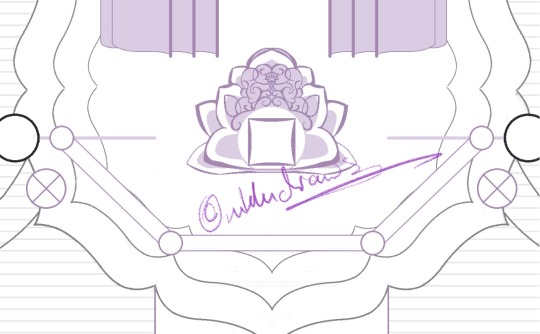
The throne room of Lotus Pier is the most elaborate set yet imo, and is saturated with water symbolism and the lotus motif that defines Yunmeng Jiang.
I’d argue that nowhere is that motif more obvious than the throne itself, and its staging: the open, airy room is hung with drapes that flutter lightly in the ever-present breeze from the river around them, and on its plinth the throne is framed by rolls of reed curtains, backed by a lotus-shaped viewing window.

I can’t wait to share my full set analysis with you! Meanwhile, the roof tiles on the throne room façade are slowly killing me.
In the meantime, you can find two more detailed previews of this project on my ko-fi (linked below). If you have the money to spare and would like to add to the coffee spoons that fuel this project, please consider dropping by!
Links for the first projects in this ongoing series:
Part 1: The Jìngshì (And the original pencil sketch, here)
Part 2: The Hánshì
My Ko-fi: nikkidraws
#nikkidraws#lianhua wu#lotus pier#the jingshi#the quiet room#the hanshi#the cold room#yunmeng jiang#gusu lan#traditional chinese architecture#set design#set details#cql meta#cql fanart#the untamed meta#the untamed fanart#technical drawing#WIP#jiang cheng#wei wuxian#yunmeng brothers#chinese architecture#chinese drama#cdrama#set decoration#cql set design
62 notes
·
View notes